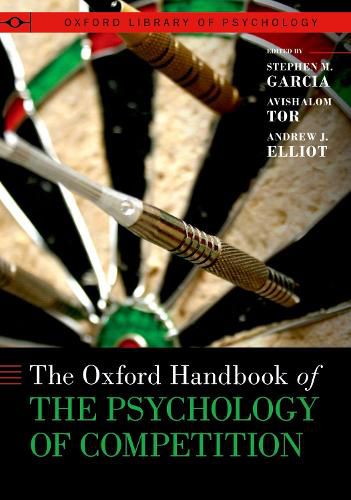Readings Newsletter
Become a Readings Member to make your shopping experience even easier.
Sign in or sign up for free!
You’re not far away from qualifying for FREE standard shipping within Australia
You’ve qualified for FREE standard shipping within Australia
The cart is loading…






In The Oxford Handbook of the Psychology of Competition, Stephen M. Garcia, Avishalom Tor, and Andrew J. Elliot review and organize the literature on the psychology of competition and bring together leading researchers studying competition across the field of psychology. The first section on Biological Approaches reviews findings on competition from the subfields of psychobiology, neuroscience, psycho-endocrinology, and evolutionary psychology. The section on Motivational and Emotional Approaches examines the opposing motivational forces in competition and describes how competitive motivation is influenced by goals, competitive arousal, and envy. Cognitive and Decision-Making Approaches showcases relevant findings from the literature on judgment and decision making, social dilemmas, cognitive biases, and risk-taking. The section on Social-Personality and Organizational Approaches includes chapters on trait competitiveness, gender differences in competition, rivalry, status competition, and social comparison. The volume concludes with a section in which the psychological study of competition is focused on specific contexts, such as sports, education, and culture. The Oxford Handbook of the Psychology of Competition is a crucial interdisciplinary investigation into the variety of perspectives and approaches to the psychology of competition, facilitating new research and integration in the field.
$9.00 standard shipping within Australia
FREE standard shipping within Australia for orders over $100.00
Express & International shipping calculated at checkout
In The Oxford Handbook of the Psychology of Competition, Stephen M. Garcia, Avishalom Tor, and Andrew J. Elliot review and organize the literature on the psychology of competition and bring together leading researchers studying competition across the field of psychology. The first section on Biological Approaches reviews findings on competition from the subfields of psychobiology, neuroscience, psycho-endocrinology, and evolutionary psychology. The section on Motivational and Emotional Approaches examines the opposing motivational forces in competition and describes how competitive motivation is influenced by goals, competitive arousal, and envy. Cognitive and Decision-Making Approaches showcases relevant findings from the literature on judgment and decision making, social dilemmas, cognitive biases, and risk-taking. The section on Social-Personality and Organizational Approaches includes chapters on trait competitiveness, gender differences in competition, rivalry, status competition, and social comparison. The volume concludes with a section in which the psychological study of competition is focused on specific contexts, such as sports, education, and culture. The Oxford Handbook of the Psychology of Competition is a crucial interdisciplinary investigation into the variety of perspectives and approaches to the psychology of competition, facilitating new research and integration in the field.